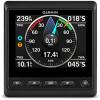Garmin GMI 20 Installation Instructions - Page 2
Connection Considerations - installation
 |
View all Garmin GMI 20 manuals
Add to My Manuals
Save this manual to your list of manuals |
Page 2 highlights
Connection Considerations The marine instrument connects to power and to data sources through a NMEA 2000 network. Although the instrument cannot directly receive NMEA 0183 data, it can display NMEA 0183 data from sources connected to a GNX™ 20 or GNX 21 device (sold separately) on the same NMEA 2000 network. The instrument can also receive data from Nexus® instruments and sensors using a GND™ 10 device (sold separately). NMEA 2000 Connection Considerations NOTICE If you are connecting this device to an existing NMEA 2000 network, the NMEA 2000 network should already be connected to power. Do not connect the NMEA 2000 power cable to an existing NMEA 2000 network, because only one power source should be connected to a NMEA 2000 network. If you are connecting this device to an existing NMEA 2000 network or engine network by another manufacturer, you should install a NMEA 2000 Power Isolator (010-11580-00) between the existing network and the Garmin devices. If you are installing a NMEA 2000 power cable, you must connect it to the boat ignition switch or through another in-line switch. NMEA 2000 devices will drain your battery if the NMEA 2000 power cable is connected to the battery directly. The marine instrument connects to a NMEA 2000 network on your boat. The NMEA 2000 network provides power to the marine instrument and data from NMEA 2000 devices such as a wind sensor. The included NMEA 2000 cables and connectors allow you to either connect the device to your existing NMEA 2000 network or create a basic NMEA 2000 network if needed. If you are unfamiliar with NMEA 2000, you should read the "NMEA 2000 Network Fundamentals" chapter of the Technical Reference for NMEA 2000 Products. To download the reference, go to garmin.com/manuals/nmea_2000. Wind transducer GND 10 black box bridge Marine instrument Ignition or in-line switch NMEA 2000 power cable NMEA 2000 drop cable Power source NMEA 2000 terminator or backbone cable NMEA 2000 T-connector NMEA 2000 terminator or backbone cable NMEA 0183 Connection Considerations • The marine instrument can receive NMEA 0183 data from one device using a NMEA data cable (not included), but it cannot transmit data from the NMEA 0183 device to the NMEA 2000 network. • If you are replacing a legacy Garmin marine instrument that currently uses a NMEA data cable, you do not need to purchase a new data cable, but you might need to replace the quarter-turn locking ring with a threaded locking ring. See your local Garmin dealer or www.garmin.com for more information. • The installation instructions provided with your NMEA 0183 compatible device should contain the information you need to identify the transmitting Tx/A (Out +) and Tx/B (Out -) wires. • When connecting NMEA 0183 devices with two transmitting wires, it is not necessary for the NMEA 2000 bus and the NMEA 0183 device to connect to a common ground. • When connecting a NMEA 0183 device with only one transmitting Tx (Out) wire, the NMEA 2000 bus and the NMEA 0183 device must connect to a common ground. • For extended runs, you should use at least 0.33 mm2 (22 AWG) wire. • You must solder and seal all connections with heat-shrink tubing. Wire Color Wire Function Red A red wire is present only on some variations of the data cable, and should not be connected. Black Accessory (-). This wire is used only when connecting the marine instrument to a Garmin HVS GPS antenna. Yellow Accessory (+). This wire is used only when connecting the marine instrument to a Garmin HVS GPS antenna. Blue Tx/A (Out +). This wire is used only when connecting the marine instrument to a Garmin HVS GPS antenna. White Tx/B (Out -). This wire is used only when connecting the marine instrument to a Garmin HVS GPS antenna. Brown Rx/A (In +) Green Rx/B (In -) NMEA 0183 Connection Diagrams This diagram is an example of a connection to a standard NMEA 0183 device with two Tx wires. 2 GMI 20 Installation Instructions







